8 Free File & Folder Size Checker Tools [2023 List]
When someone tells you they’re running out of hard drive space, the first thing you would probably tell them to do is to clean up the system using a program such as CCleaner. That will help remove all the junk and temp files that can take up several Gigabytes on badly affected systems. Uninstalling old software might free up some more space depending on how many useless programs are installed.
Even after doing those things, a system might still be left with less than 10% of free space remaining and Windows doesn’t really like that. Even if you have the operating system on an SSD or an NVMe drive, Windows will still slow down and misbehave if it runs out of available space. Other locations on the drive might have been filled with data that you or most cleaning programs wouldn’t normally look in.
The normal thing to do would be to check the properties of each top level folder and navigate your way down until the culprit files and folders are found. This could certainly waste a lot of time and isn’t an efficient method. Thankfully there are much better solutions for how to find out what files and folders are taking up hard drive space, and here’s a selection of 8 free tools to do just that.
Best File Viewer Software
1. TreeSize Free
TreeSize Free is a popular tool because it quickly gives you a fair idea of which folders are taking up the most space. The occupied proportion of space each folder takes up is shown by a series of bars, and when you click to open each subfolder, the same bar layout shows the space proportions for that folder. With version 4.0 In 2017, TreeSize Free was updated to include the popular treemap view which was taken from its paid Professional version
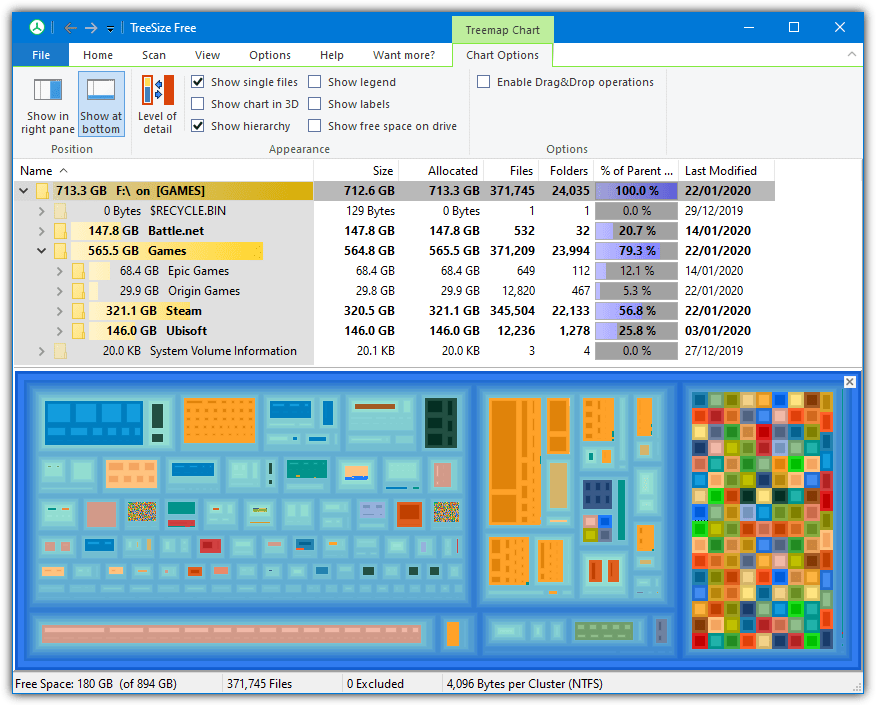
Click the upper half of the Open Directory icon to open a requester or the lower half to open a drive list. TreeSize uses the MFT (Master File Table) to scan NTFS drives so is incredibly fast. By default, the file and folder tree is displayed with the size bars. To also open the treemap, click on View > Show Treemap Chart. The treemap can be shown on the right or bottom, be in 2D or 3D, and show labels/files, free space and etc.
Changes can also be made to the way the folder tree looks. For example, the text can be changed from size to file count to a percentage. You can also change the gradient colors on the size bar and change the UI itself to a dark or touch theme. Include/Exclude filters can be applied, and the program can be configured to let you easily run a scan from the Explorer context menu. Installer and portable versions are available.
2. SpaceSniffer
We’re fans of SpaceSniffer because apart from being quite fast, it’s live visual treemap layout can quickly give a very good idea of which files or folders are taking up the biggest amount of space on your drive. This has an advantage over software that only shows a bar or pie chart because you can already see several layers down. A massive file buried inside multiple subfolders is far easier to spot without touching anything.
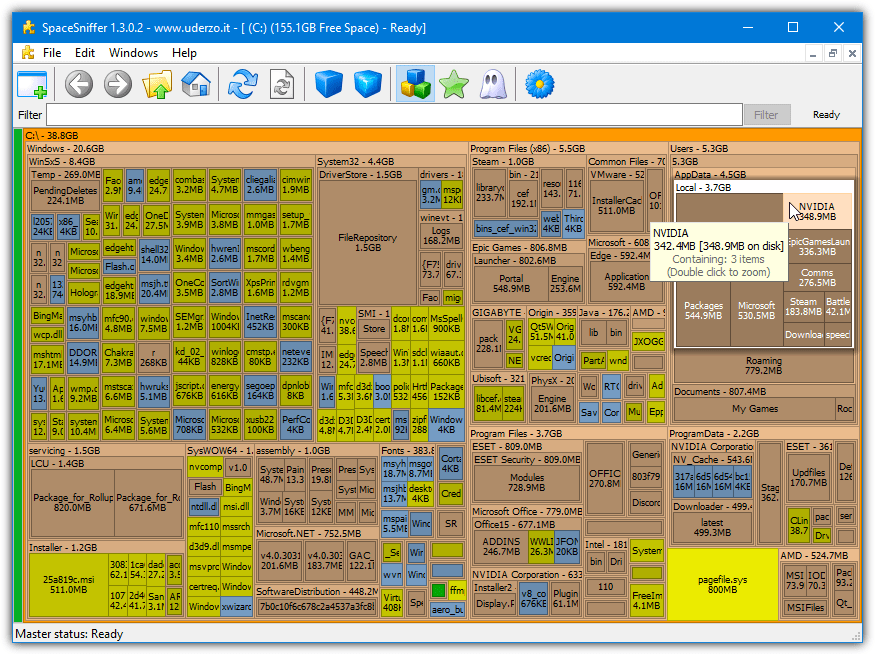
Simply choose a drive or folder to scan from the box when you start SpaceSniffer and within a few seconds you will be able to recognize larger folders (brown boxes) and files (blue boxes) filling up the display. The bigger the box, the more space it occupies. Folders can be drilled down even further by double clicking on them, or the level of detail can be increased using the blue box icons in the toolbar.
The tri-colored box icon also shows different types of files with different color boxes. For example, the blue boxes are archives and disc images while the yellow boxes are executables and system files. There are other color styles for audio, video, and images or you can even create your own. Other aspects of the treemap display can be altered from the Edit > Configure window. SpaceSniffer is a zipped portable executable.
3. RidNacs
This program is like a simpler and easier to use version of TreeSize in that it displays a number of bars to represent the percentage of space occupied on the drive or in the folder. It can show files in the tree and also the folder size, percent and number of files all at once though which might be more helpful.
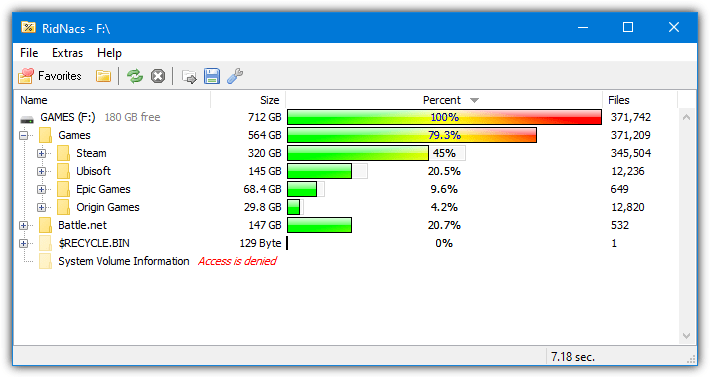
To scan, press the yellow folder icon in the toolbar or click on the favorites button which should have your drives and any previously visited folders listed for quick access. The scan is reasonably fast and a report can be saved in a TXT, HTML, XML or CSV file. The size bars can also be changed to different preset colors which is useful as the default blue stripe isn’t great (the image shows the Spectrum bar).
RidNacs has a portable and setup installer version. The website is in German but the download page is self explanatory and the program itself defaults to English.
4. WizTree
WizTree is by Antibody Software who also make the useful WizMouse and WizFile utilities. The program is very similar to the popular but very old WinDirStat (see below) but is much faster to display its results. WizTree is one of the fastest tools of this type and on par with TreeSize because it also uses the Master File Table to scan the drive. There is an animated donate button in the window but it isn’t really a problem.
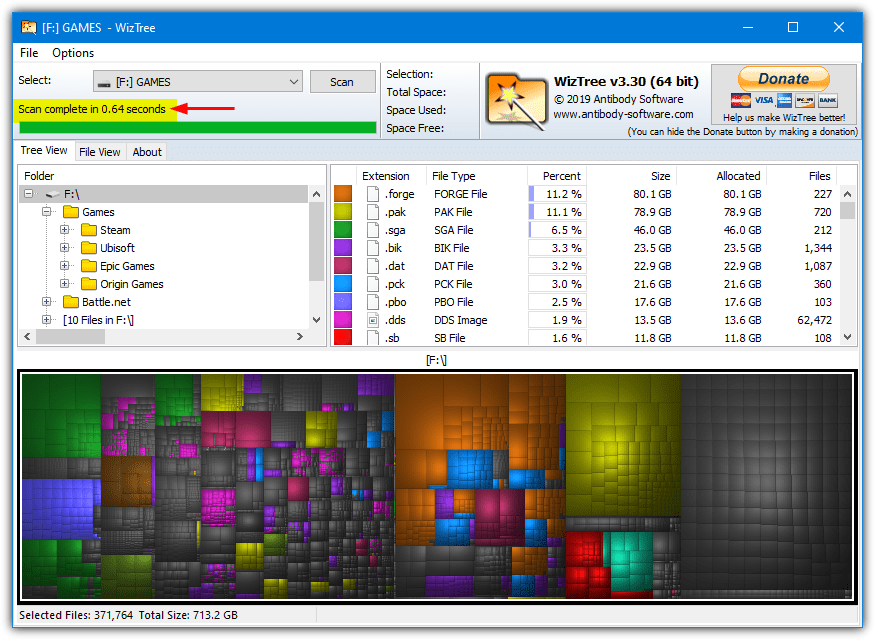
Select a drive or specific folder from the drop down and the results will be shown pretty quickly. The window is split into the file/folder tree view, the filetype view and the treemap at the bottom. Switching from Tree View to Flat View will change the window to a search filter and file display with options to sort the top files by size, modified date and etc.
Additional options include the ability to open a command prompt here, copy the file path, export to CSV, save the treemap as an image, dump the MFT file, and change the default treemap colors. Portable and installer versions are available.
5. WinDirStat
WinDirStat is another tool to use the treemap visual interface which shows the size of individual files as a series of boxes to represent their space on the drive. It’s also still a popular tool considering there have been no updates since 2007. Some useful extra functions are included such as opening a Command Prompt at the location you’re clicking on, copying the file path or emptying the recycle bin before a scan.
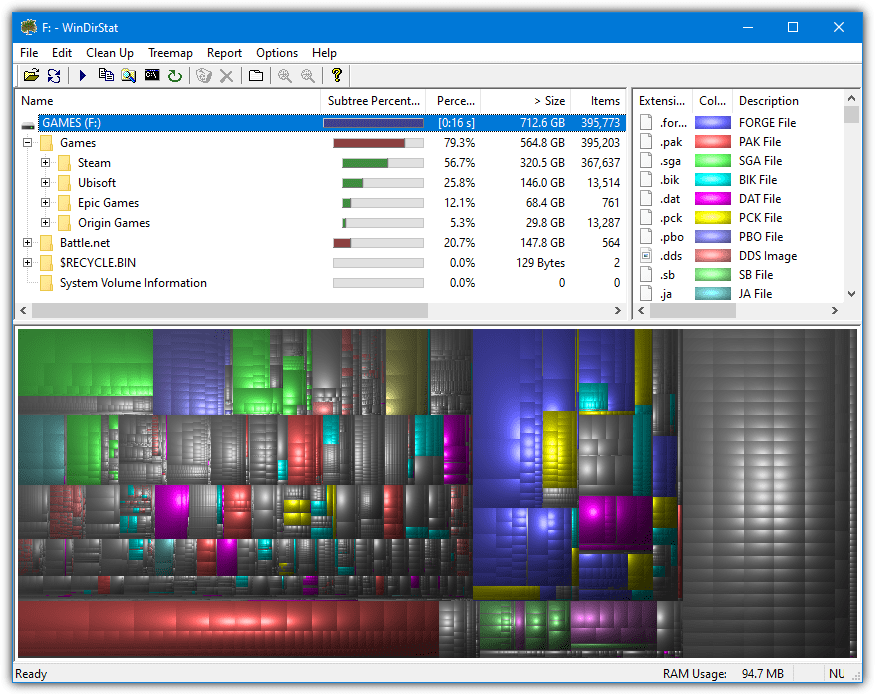
If you have more than one drive to scan they can be selected on startup by highlighting which ones you want. The display is split into three parts; one for the treemap, one for the directory tree and the top right window for telling you what the treemap colors represent. WinDirStat works on just about any version of Windows right back to Windows 95. WinDirStat never officially had a portable version but you can either extract the installer with 7-Zip or go to PortableApps.com to get one.
6. Xinorbis
If you’re someone that likes to look at large amounts of information then Xinorbis could be for you. This is because it analyzes and gives you details for just about everything that’s occupying your hard drive space and the data is displayed in a number of different ways. There are separate windows for things like file types, extensions, history, dates, magnitude and size levels. Data can be viewed as text based tables, bar charts or pie charts.
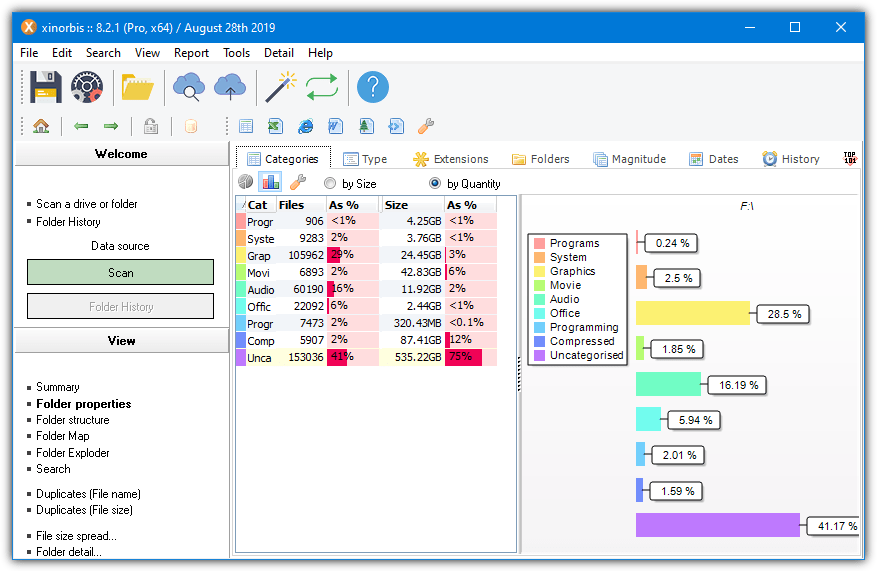
The initial Summary screen will give some useful details about the number of files/folders, the largest file and folder, and bars for which category they fall in to. Click Folder Properties and all the different ways the statistics can be presented are available. There are other useful sections like finding duplicate files, search, folder structure/map/exploder views, and opening separate windows to create your own custom graphs and charts.
There are also options to create your own custom reports in HTML or CSV. Xinorbis is probably the most comprehensive tool of this type so it does require some time to figure things out. Installer, portable and also a useful command line version is available for download.
7. Folder Size
The free version of Folder Size is perfectly usable but lacks some features that are reserved for the shareware versions. These include filters, export/print results, scanning over a network, multiple scans and command line options. There are a few ads for other products by the developer in the UI, but they aren’t too intrusive.
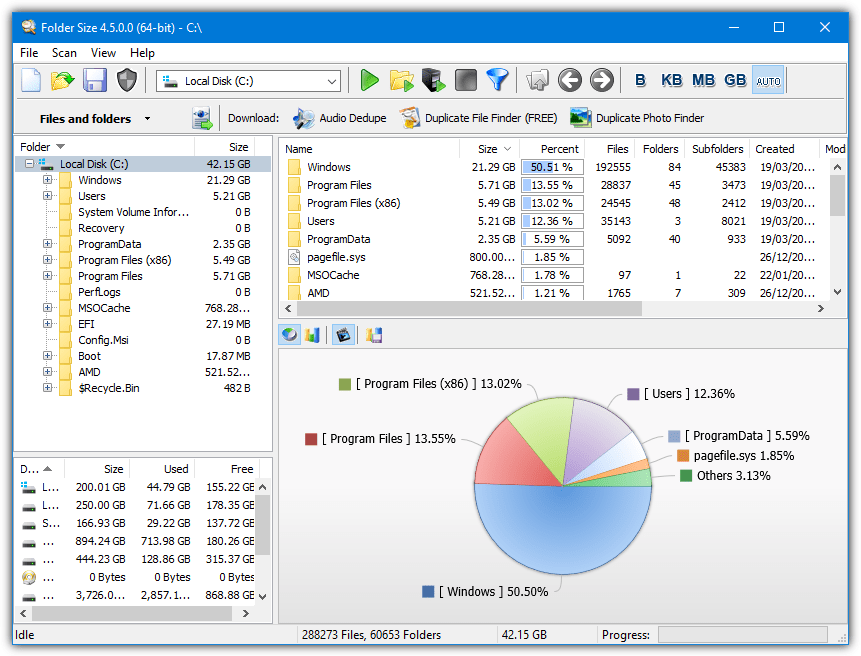
Start the program and choose the drive from the drop down, then press the green scan icon, or a folder using the green/yellow icon. You will get both a text based view of the folder sizes and also the graphical view, either of which can be turned off. Switch between a pie chart or a bar graph using the icons in the lower pane. Then simply navigate your way around to see which files and folders are taking up space. Both portable and installer versions are available.
8. JDiskReport
JDiskReport is a tool that runs using Java meaning you need the Java Runtime Environment installed to use it. What’s quite good is the different ways in which you can visually view the information. For instance, the size of a folder or drive can be displayed as different looking charts such as a pie, ring, bar or a details list. The color of the charts or the interface look can be changed and a context menu option can be integrated into Explorer.
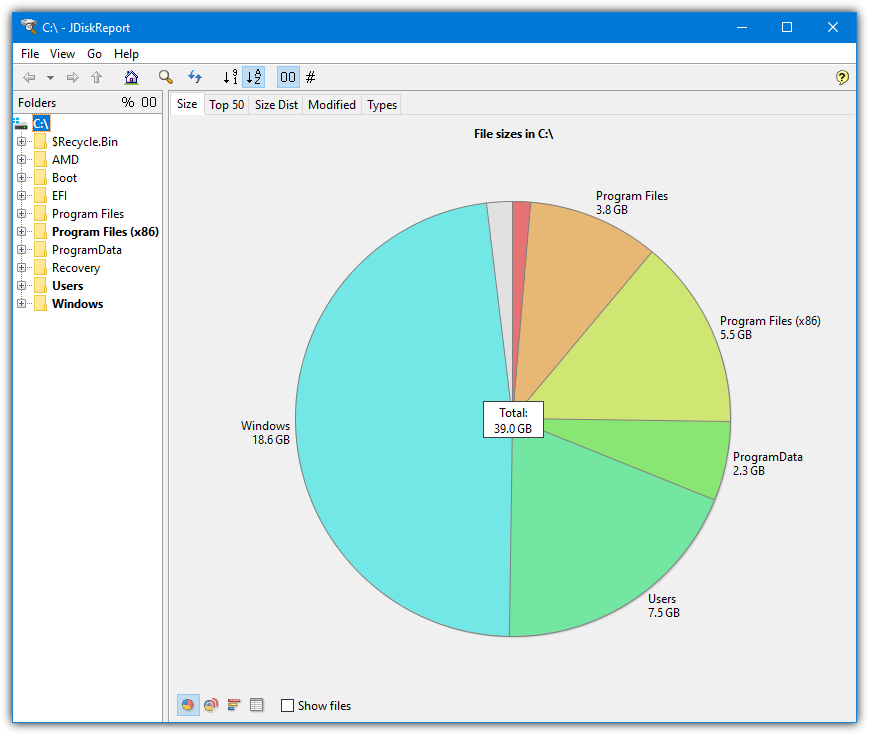
Starting the program gives options to select the folder or drive to scan along with a few previous scan locations and the option to reload a previously saved scan result. There are different tabs to view the information in different ways including a size tab that gives the overall size of the selected location, a Top 50 tab which lists the 50 largest/oldest/newest files, and size/modified/filetype distribution maps.
Download the Zip archive on the website to use the portable version. If it doesn’t run, right click on jdiskreport.jar > Open with > “Java Platform SE Binary”. Being made in Java means JDiskReport is supported on a number of platforms including Mac OSX and Linux as well as Windows.
Important Note: Unless you’re very sure the files and folders listed can safely be deleted, don’t delete them from within these programs. Just because the data might be taking up lots of space, you need to check first that it’s not part of the operating system or installed software which could cause crashing or instability problems if you remove it.
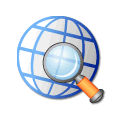
WizTree all day. Best tool I’ve come across for this.
FolderSize did exactly what I wanted, I walked down the folder tree looking for big folders. I found 20gb of Windows install logs from 2011, realized I had a folder duplicated which cleaned up 7gb. The biggest culprit was a 15gb log file for McAfee. I didn’t dig into any fancy features for this tool or the others. I just needed to see directory sizes so I could investigate. And like the warning in the article, it’s very easy to delete files that shouldn’t be deleted.
TreeSize Free helped me to clean up my Music Library which was ruined by iTunes. I was putting the task off for years, but this helped me speed it up by orders of magnitude, thanks!!
I use Directory Report. It looks just like the MS-Explorer but always shows the folder size. This lets me to quickly drill down to problem folders which contain the huge files.
Except that it costs $25
I reccomend to use this utility to find top-N largest folders/files on a disk:
github.com/aleksaan/diskusage
I use Large Files and Folders Finder+. That is the only app that does the job. It finds large files and folders. It returns the complete report and works very fast too. It has some additional features such as Disks Watchdog.
Hi actually none of them check dept of Path (directory levels) as I can see , but is ther som good tool for that on w2012?
Gave WizTree a go tonight. It does not report accurately at all. I noticed it when I scanned the hard drive I use for all of my games. It was showing many directories as having 100MB, less, or even 0 bytes, when each are in the multiple GB range.
I just used it on a drive that contains most of my games (1.2TB) and it detected everything correctly. It’s possible it could be something like UAC or permissions that is causing your issue?
Scanner is AMAZING: tiny, fast, useful, free ! (steffengerlach.de/freeware/)
The best is Jdiskreport, but i hate java
Oh wow thx. This is awesome! Scanner is the fastest thing of them all he just needed seconds to scan may 250gb ssd while jdiskreport and WinDirStat need over 10 minutes
I tried a few of these – spacesniffer was the one I liked best!
I still use the free “SpaceMonger”, and skimming over this post I know exactly which one I want.
“SpaceSniffer”
That style of display is by far the quickest, as you literally see everything.
Very useful post.
WizTree for the win. Is the fastest hands down.
Yeap, I would agree WizTree is a very quick tool and would have been included if it was around when the post was written. It is something that will very likely be added when this post gets an update. Personally, I still prefer SpaceSniffer though :)
WizTree the best. Thanks for the recommendation. ^_^
I have spent days trying to remember the name of this. I kept looking for wizard tree! I agree this is by far the best one to get an overview of everything. thank you!
i’m using windirstat. faster to scan and easier to read than some other (not listed above) softwares.
most of those softwares “slow” on updating the UI
thanks for sharing the list easy the pain looking for alternatives. but it seems none of them scan in the way like “everything.exe”: read MFT instead of iterating over directory. i’m still looking forward to seeing one
WizTree is an interesting one, working off the MFT, so its fast (& free).
thank you for the information, I’ll download one of the software.
Amazing tools list! My work is more easy now. Thank you very much.
Such a wonderful post!!! It helps me a lot. Great post! Thx.
The best for me is Scanner: steffengerlach.de/freeware/
I recomended it!
Another free tool of Hard Drive manager for you! With this utility, you can create, format, resize and delete the parition. Totally free for home users. Download free here.
fat-32-formatter.com/?trblo
A similar product is sequoia view, also very easy to use works fine on xp and win7 (only tried it on these two). I do reccomend it`s usage.
Such a wonderful post!!! It helps me a lot. Thx.
thanx for software update & it’s vey amazing
Thank you. in Ubuntu i use disk analyzer.
best is Filepro, also Portable
what a great tip.Thanks for sharing wonderful information
Thanks for the article, just tried Space Sniffer for the first time and love it! My 1.5TB hard drive is a mess – now I have a new favorite toy ;)
Something funny going on though, this article is dated Oct 16 this year, but there are comments from two years ago?
Well spotted Mr.Bigglesworth! This post is actually a 100% totally new article that replaces an old post with the same subject from 4 years ago. Raymond is going to write about the reasons for this and other things such as the new theme hopefully in the next few days. As Treesize and JDiskReport were in the original post, any commments that can stay were left in.
SPACE MONGER looks like space sniffer, but it shows subfolders too. sixty-five.cc/sm/
Great post! But isn’t there any tool that gets embedded into windows explorer so that a live status can be obtained!!!
WinDirStat is my favourite but thanks to your article I’ll now try some of the others on offering. Keep up the great work, Hal9000. Always a buzz to get ideas from this site.
thanks very much……this is what i was looking for…Treesize is the best software
Raymond,
what a great tip, how come the people whom created the Vista, Outlook don’t know it….
I found 2 monstrous sized Hotmail files for MS Outlook! So I moved them to E drive instead of C. Freeing C drive with additional 10 GB.
Thank you, thank you, thank you….
Hani
Thanks for sharing wonderful information.
Thank you so much! I was one of the people who got CCleaner and started wiping files and defragmenting my disk for small amounts of space, going through my official list of programs and finding nothing that takes up that much space, or finding things that take up space that i still use. You saved me so much space. Thank you.
Hi, thank you soo much! after a couple of months of wondering where approx 150GB had gone, this Free and easy to use program showed it up in minutes!! i am no PC expert and this is a fantastic program which works well…thanks again!
Thanks buddy.
Excellent software, does exactly what it says on the tin, simple to use and easily installed. Many thanks for sharing it.
Thanks, I was looking for something like this :)
WOW. This program rocks. I did a complete reformat and thought all my pics which I backed up onto an external hard drive would have been wiped out. Was driving me crazy why I only had 2 gigs left on my hard drive. All my pics and programs were still there. This sotware found it all and allowed me to clean up my computer. This ought to be on cnet to download bet you could get a million downloads easily. Thanks again.
Thanks SO much! I used JDiskReport and freed up 88GB of space!! I had no idea one of my programs was keeping backups of projects! Thanks again!
Thank you for the resource I will be using this often! :)
This is the best tool EVER!!! Ive regain 50 gb hardisc space using this and i loove it! thank u thank u thank u!!!
very useful thanks.